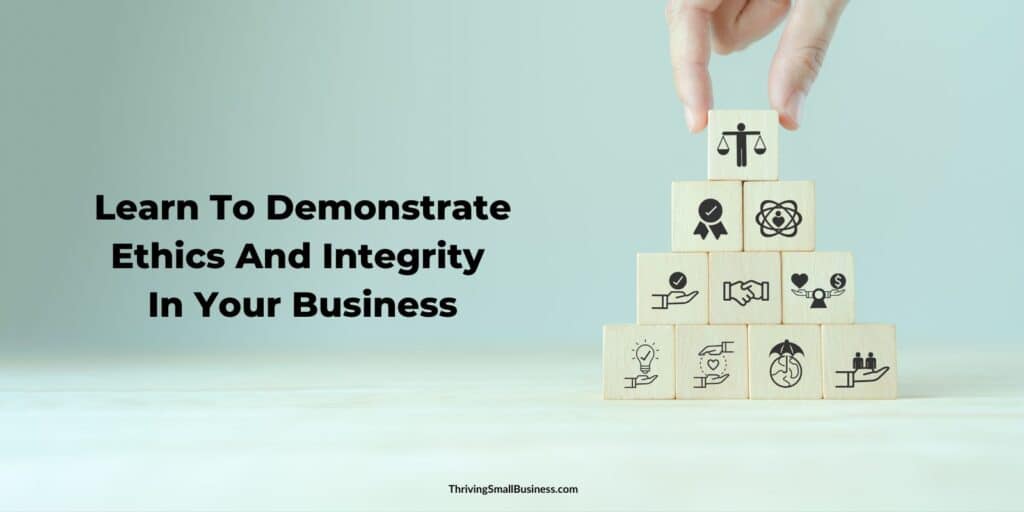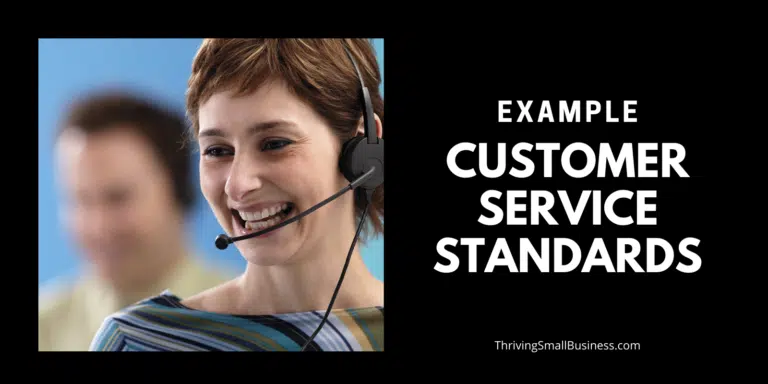7 Ways to Demonstrate Ethics and Integrity in Your Business
Estimated reading time: 5 minutes
The success of an organization is built on the trust of customers, employees, and the general public.
According to a Gallup poll, “68% of adults worldwide believed corruption was widespread among businesses in their country…… and 60% of adults in the U.S. responded this way in 2017…..”
The best way to gain that trust is to demonstrate ethics and integrity in business practices.
Not because of legal requirements – but because it is the right thing to do.
A great example is the infamous Enron Collapse and Bernie Madoff Ponzi scheme stories. Thousands of employees and investors were impacted.
This resulted in corporate collapse due to unethical behaviors and business practices.
Gallup research has shown that millennial-age employees, in particular, want their careers to coincide with their values; they view their jobs as sources of meaning and purpose rather than just a way to make a living.
The integrity of a business affects all customer groups and every area of business operations. This is why it is important to incorporate ethics and integrity into the core fabric of the organization.
7 Ways To Demonstrate Ethics and Integrity In Your Business
1. Customer Value Strategy
Ethical standards in business are built off of a customer focus and commitment to providing value to its customers.
When an organization is committed to improving the lives of its customers, a violation of that trust will cause concern from a strategic perspective.
For instance, the Facebook privacy and data sharing scandal caused users to mistrust the company. There was deception, and users did not understand how Facebook was using their profile data.
It is not something you would prefer if you are committed to providing value to your customers.
2. Accounting Practices
Financial honesty and transparency are basic expectations of shareholders, customers, and employees.
It serves no one when organizations “cook the books” – whether it be intentional or accidental.
Careless accounting practices limit an organization’s ability to operate with sound financial management.
How can an organization’s budget be accurate when there is not complete transparency in spending?
3. Truth-in-Selling
When an organization markets a product or service, it is obligated to deliver what it promised to the customer.
Whether it is a television ad or an ad on social media, the product described should be what is delivered to the customer.
For instance, we responded to a furniture ad one time. When we went to the department store, we discovered they were out of that particular item, and the salesperson tried to sell us a similar but more expensive item.
Needless to say, we walked out of that store. Unfortunately, the sting of the “bait-and-switch” experience kept us from visiting that department store again. It’s not a good way to grow a customer base.
You owe it to your customers to deliver what is promised.
4. Integrity in Management Practices
Management practices are the underlying foundation for organizational integrity.
Whether it is a commitment to good customer service or fair employment practices, a business’s reputation can be tarnished by unresolved service or product issues.
Additionally, employees observe how leadership resolves issues and follows up on promises made.
For example, SAS ranked number 1 out of the top 100 employers to work for in 2010.
In addition to a very generous benefits package and an industry-low turnover of merely 2%, the architect of its culture is based on “trust between our employees and the company,” according to Jim Goodnight, SAS CEO.
Influence integrity in managing by creating a code of conduct and ethics policy. Teach employees the importance of its content and the organization’s commitment to ensuring that all employees adhere to the policy.
5. Customer Service Integrity
Service after the sale is what service integrity is all about.
It is easy to make promises before a sale, but following up and ensuring a great customer experience is what makes some organizations stand out.
For example, we built a house a few years ago. The customer experience was over the top – until we closed on the house.

Unfortunately, it went from one of the best service experiences I’d ever had to one of the worst – after we closed the deal.
Service after the sale is critical to providing a great customer experience and growing a loyal customer base.
6. Personal Integrity
It is important for business leaders to live a lifestyle of honesty, integrity, and high ethical standards because what these leaders do can harm the organization’s reputation.
Two former Tyco executives, who have become the poster children for failed ethical leadership, are good examples of this.
Both were sentenced to 25 years in prison after stealing hundreds of millions of dollars from the company.
The scandal sadly generated negative press for Tyco and ultimately affected the company’s value and profitability.
7. Product Integrity
Product integrity is important to those of us who purchase products and services.
This is when public perception and brand recognition come into play. When we chose our home-builder it was because they were one of the largest in our area.
Unfortunately, our experience with their service after the sale spoke volumes to us about the product integrity of this builder.
If we had known the service integrity would have changed so drastically after the sale, we would have been a little more diligent at ensuring the language in the contract supported the resolution of issues once we closed on the house.
“Trust is like the air we breathe — when it’s present, nobody really notices. When it’s absent, everyone notices.” — Warren Buffett
Organizations that operate with integrity do so intentionally and make it part of their everyday practices so that it becomes part of the culture.
This climate of honesty and trust helps orient new employees to understand that operating with integrity is simply “the way things are done around here.”
Organizations choose to make integrity an important part of cultural expectations. This focus sends a message to employees and customers that the priority is sustainable success over short-term opportunism.
In what ways does your organization demonstrate integrity and ethics?






